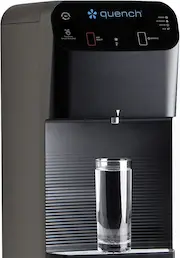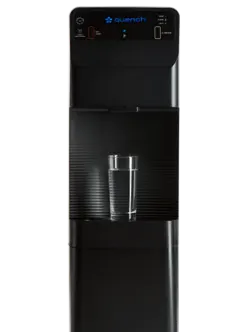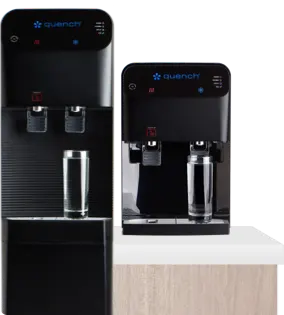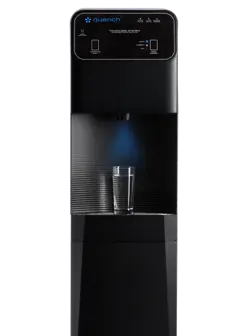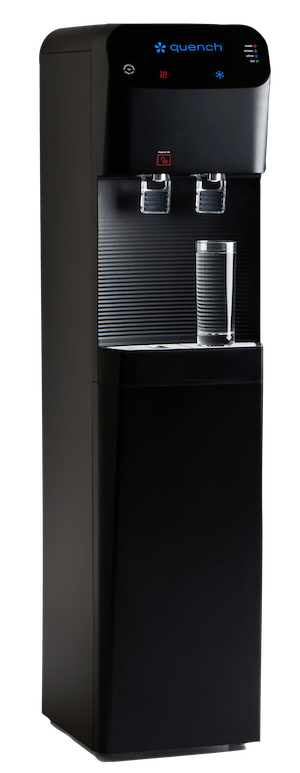An abrupt shift in societal norms due to the coronavirus pandemic has many businesses dealing with economic whiplash. The health crisis is forcing industries around the world to quickly pivot. Now may also be the time to focus on improving operations that are already in place, specifically your customer service department.
Around the globe, 96% of consumers say effective customer service is an important factor in their choice of loyalty to a brand.[1] Customer experience and delivering high levels of customer satisfaction improves brand loyalty and increases sales, which is why it’s a top priority for many forward-thinking businesses.
We reached out to Quench’s Vice President of Customer Care & Operations, Debbie Romano, and asked her to share her expertise on customer service and customer satisfaction. Debbie leads Quench’s customer care team, which is responsible for delivering post-sale service and support for Quench’s 60,000+ customers nationwide. She has twenty years of experience in customer service and call center management and has been keeping our Quench customers happy for over 3 years.
Q. Why is the customer care aspect of the customer experience vital for a business to succeed?
A. Being available to provide support whenever a customer needs you is a cornerstone to building a solid, long-lasting relationship. Customers need to know they can count on you for 5-star customer service skills when they need it. It has been essential for Quench, as in all businesses, to provide the level of support that creates the foundation for a strong relationship.
Q. What are the most important aspects of building a strong customer relationship?
A. 3-part communication: First, always be available to provide consistent customer support through multiple communication channels. Second, always address complaints and negative feedback right away, head-on, and with transparency. By coming up with a solution that works for all, you can easily turn a negative experience into a positive one. Thirdly, ask for feedback from customers regularly and act on it. By doing this, you can continually improve service and provide the most cutting-edge products/service for your customers.
Q. Why is it important to gather customer feedback?
A. Gathering customer feedback shows you value their opinions. By asking for feedback, you are involving the customer in shaping your business; this will lead to greater attachment and loyalty. You get to learn what customers like and don’t like, and then can constantly improve based on their feedback. At Quench, we gather feedback through NPS (Net Promoter Score), which we do quarterly and by sending a Customer Satisfaction Survey out after each completed service/installation. The most important thing, though, is what you do with the feedback. Don’t ask for it if you are not going to use it to improve. Customers want to be heard – but also acknowledged through the positive changes and improvements made based on the feedback provided.
Q. A Net Promoter Score (NPS) is a good way to measure a company’s customer experience management program. What actions do you and your department take to improve Quench’s NPS?
A. First, it’s important to note how seriously we take NPS at Quench. I personally read the customer feedback from every NPS survey we receive because it’s so important to understand where the customer is in our relationship. There are nuggets of feedback that can’t be ignored and when you put them together, they tell a story about customer purchasing behavior, customer churn, customer desires and needs, all of which can influence future offerings and help identify areas for improved service delivery.
Our actions are both immediate and longer-term. First, every detractor is contacted via phone so we can get a greater understanding of the challenges and then put immediate and permanent fixes in place. I participate in this activity by taking a portion of the customers and calling them myself; it’s one of my favorite customer support activities to do. The second thing we do is complete a detailed trending analysis of the feedback to identify opportunities to change or stay the course. NPS is more than a number, it’s a gold mine of opportunity. You just need to listen.
Q. How do you work with other departments within Quench to improve customer experience?
A. At Quench, we have cross-functional standup meetings throughout the week with leadership from the key teams that provide direct/indirect customer support (ex. Customer Care, Sales, Supply Chain, Field Service). We follow a specific agenda that focuses on the top customer issues, new business, customer projects, etc. and we solve these together as a team. These meetings get everyone on the same page with a solid plan, which enables us to act quickly and efficiently for our customers.
Q. What is the difference between customer care and customer success? Is either one more important than the other?
A. Customer care and customer success are both important when you are looking to develop what I call “customers for life.” Customer care is generally “reactive” in approach, helping a customer once they need something or when they reach out with a problem or question. In contrast, customer success is “proactive,” focusing on helping customers reach their desired outcomes while using your product or service.
Q. What is the best way to approach a disgruntled customer?
A. Every customer situation, even with an unhappy customer, is an opportunity. You always need to have that in mind with every interaction. The best approach is to 1) listen actively to what has happened, 2) repeat the concerns so you ensure you fully understand, 3) be empathetic and apologize for what occurred, 4) present a solution, 5) take action, and 6) follow up to make sure the resolution is satisfactory. Finally, and most importantly, use the feedback provided to reduce the risk of the situation ever happening again.
Q. How does employee satisfaction relate to customer satisfaction?
A. There is a direct link between employee satisfaction and customer satisfaction. Employee interactions with customers set the tone for positive or negative customer experience. If an employee is not happy at work, their interactions with customers will suffer. At Quench, we work hard to ensure employee satisfaction through ongoing employee engagement activities. This includes fun things such as contests, social events, and celebrations, etc. that make a workplace an enjoyable and desirable place to be at. But it also includes ensuring that employees are well trained to be successful, have career development opportunities, are part of process improvement planning, and understand that they are valued contributors to the greater good through recognition and celebrating success.
Q. What do you think sets Quench’s Customer Service apart?
A. Customer service at Quench is the responsibility of every employee, not just the Customer Care team. We foster this mentality across the organization and make sure every employee at all levels is available to provide support as needed or connect the customer with someone who can help them right away. Customer service at Quench goes way beyond the products/services we provide; it’s a lifestyle we all adopt in our day-to-day relations with our customers.
Q. How has the COVID-19 crisis forced you to adjust your customer service operations?
A. We’ve continued to remain open the same hours as normal to ensure we are available to address any customer questions or issues. We’ve also proactively communicated with our customers about the safety practice of our technicians and how to keep their water/ice units operating optimally. Finally, we have worked with our customers to schedule services when they are at their locations and are ensuring we meet their safety requirements. It’s all about being flexible, transparent, and working cooperatively to get the job done.
You Can Count on Quench for Effective Customer Service
At Quench, our customers are our top priority. We understand that your trust is built on being transparent and delivering promises. We’ve created COVID-19 FAQs, re-opening procedures, and blog posts to help ease your concerns about transmitting coronavirus in water.
We’ve also responded to your request for more touchless office water cooler options. Quench just made a hands-free solution available for our Q7 Series. Now you can get a foot pedal installed for your Q7 office water coolers. The foot pedal lets you dispense clean, great-tasting water without the need to make direct contact.
Our other touchless office water dispensers are the Q5 Series features dispensing paddles and our Quench 980 series with touchless sensorSAFE dispensing of ice and filtered water. Neither requires hands-on contact with the machines.
Call or email our team today and ask about touchless water coolers for your office.
Quench is dedicated to your well-being. We pride ourselves on being your go-to source for point-of-use (POU) office water coolers. When you return to work, you can rest assured the Quench Water Experts will be there to offer our 5-star customer service skills and great-tasting water. Learn more about Quench and our water services here.
[1] http://info.microsoft.com/rs/157-GQE-382/images/EN-CNTNT-Report-DynService-2017-global-state-customer-service-en-au.pdf
